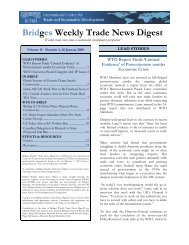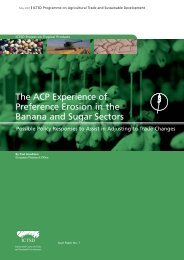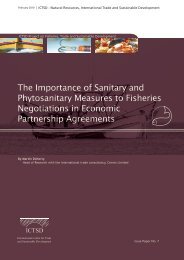Geographical Indications
Geographical Indications
Geographical Indications
Create successful ePaper yourself
Turn your PDF publications into a flip-book with our unique Google optimized e-Paper software.
ICTSD-UNCTAD Project on IPRs and Sustainable Development9has been considered “dangerous” when “applied to other fields of intellectual propertyrights. There is no valid argument why it should be different for geographical indications”(IP/C/W/308/Rev.1, para 18).Importantly, all Members recognise the hierarchy in protection and that Article 23 allows fora higher level of protection. Here, Members opposing GI-extension enter the debate tocaution demandeurs that protection under Article 23 is not ‘absolute’ as often characterised.As such, some goods may not satisfy the conditions for grant of protection and/or many maybe exempt from protection in third countries on the basis of exceptions in Article 24. Incontrast, demandeurs have focussed on the ‘burden of proof’ difference between Articles 22and 23; noting that invoking Article 23 requires a proof of the geographical origin of the good.They conclude that Article 23 is more effective, easier to access and cheaper to actualise.Reviewing the different submissions, we feel that the debate at the TRIPS Council wouldbenefit by moving beyond these issues and seeking substantive evidence of the comparativeworking of Articles 22 and 23.The third theme relates to the potential costs of GI-extension and involves the administrativeburden of GI-extension, costs associated with consumer confusion and costs on account oftrade and production disruption. We consider the questions raised here as substantive. Moreso because, as Members opposing GI-extension state, “like any re-balancing of TRIPS rightsand obligations – would involve certain costs and shifts in burdens among Members”(IP/C/W/189, p6).Members opposing GI-extension suggest that GI-extension “could have a considerable burden”in light of the “hundreds of domestic geographical indications” that some Members (read ECand its Member States) seek to protect – a burden that may disproportionately impactdeveloping countries (IP/C/W/289, p7). While the latter point (i.e. disproportionate burdenon developing countries) is not directly addressed by demandeurs, they make three points:(a) Article 23 only requires providing the ‘legal means’, an obligation similar to Article 22, (b)the demand is for a change in the product coverage of Article 23 and (c) Article 23 protectionwould lower the legal costs of securing GI-protection. As far as implementation costs areconcerned, the following points need to be noted: (a) expanding the product coverage ofArticle 23 will entail some static costs; (b) the level and frequency of use of GIs is relativelylimited compared to any other IPRs; (c) the burden for enforcing GI-protection fallsdisproportionately on the right-holder. It is difficult to assess how these different costs andbenefits weigh up, particularly since none of the submissions at the TRIPS Council providequantitative evidence.It is suggested that GI-extension will result in the “disappearance of terms customarily usedto identify products” which “will increase search and transaction costs for consumers, at leastin the short to medium term” (IP/C/W/289, page 7). Demandeurs note that only those labelswill change that are considered infringing and not within the scope of exemptions under









